Big Brother & The Holding Company | ||
| Allmusic Biography : One of the major bands in the San Francisco rock scene of the mid- to late 60s, Big Brother & the Holding Company are best remembered as the group that introduced Janis Joplin to the world. However, the band existed before Joplin joined and moved forward after she departed, continuing to deliver their powerful fusion of hard rock, blues, and psychedelia. Formed in 1965, Big Brother had begun making a name for themselves on the burgeoning SF music scene when, in search of a powerful lead vocalist, they were introduced to a blues singer who had recently relocated to Northern California from Texas. With Janis Joplin at the microphone, Big Brother & the Holding Companys profile soared, and after a misbegotten debut album for Mainstream Records, they scored a smash with their second LP, 1968s Cheap Thrills, which went to number one on the album charts and spawned the hit single "Piece of my Heart." Cheap Thrills made Big Brother stars, but Joplin left the group only a few months after it came out, and a revamped version returned with Be a Brother in 1970. The group folded in 1972, but in 1987, the original line-up returned to the stage, and cut a studio album, Do What You Love, in 1998 that demonstrated they maintained the sound and style of their early work while adding a few modern touches. The story of Big Brother & the Holding Company begins in 1965, when Peter Albin, a guitarist with a background in folk and blues, met Sam Andrew, a fellow guitar player who was well-versed in jazz and classical as well as rock. Albin invited Andrew to his house to jam, and they decided to form a band. They soon teamed with James Gurley, another guitarist who had recently arrived in the Bay Area from Detroit. Chet Helms, a music fan and concert promoter who had been part of the burgeoning rock scene in Austin, Texas, became their manager and they were soon playing open-mike jam sessions in San Francisco. With Albin moving to bass guitar and Chuck Jones on drums, Big Brother & the Holding Company became a regular attraction at the Avalon Ballroom, a venue that was featuring fellow adventurous bands such as the Jefferson Airplane and the Grateful Dead. Before 1966 was out, Jones left the group and Dave Getz took over on drums, and BBHC began looking for a female lead singer. Helms was friends with Janis Joplin, whom he had known from his days in Texas, and persuaded her to come to San Francisco and audition. Joplins previous experience had largely been in acoustic music, and the musicians were not initially bowled over by her vocals, but they decided to give her a chance, and she first appeared on-stage with Big Brother in June 1966. Big Brother & the Holding Company hit the road, and after playing a residency at a club in Chicago in September 1966, the band discovered they didnt have enough money to get home to San Francisco. Needing to raise cash fast, they struck a deal with Mainstream, a Chicago-based label that primarily released jazz material. The group hastily recorded an album that largely focused on their low-key acoustic material rather than the heavier electric sound that was becoming their hallmark. By the time the self-titled album came out, the band had appeared at the 1967 Monterey Pop Festival, where Big Brothers performance -- and Joplins powerhouse vocals in particular -- became the talk of fans and music journalists. While the album Big Brother & the Holding Company was widely regarded as a disappointment, their Monterey set (which became a highlight of the documentary Monterey Pop) brought them to the attention of Albert Grossman, a manager whose clients included Bob Dylan, Peter, Paul & Mary, and Ian & Sylvia. Grossman took over management of Big Brother & the Holding Company, extricated them from their contract with Mainstream, and negotiated a more lucrative deal with Columbia Records. Having impressed audiences on the road (they were chosen to be the first headliners when Bill Graham opened the Fillmore East in March 1968), their second album was highly anticipated, and when Cheap Thrills (originally titled Sex, Dope and Cheap Thrills before Columbia got cold feet) arrived in August 1968, it was an immediate hit and would spend eight weeks at the number one spot on the national album charts, while "Piece of My Heart" was a major Top 40 hit. As Big Brother & the Holding Companys fame grew, Janis Joplin increasingly received far more attention than her bandmates, and after the group finished a summer tour, Joplin informed them that she was quitting BBHC to go solo. On December 1, 1968, Joplin played her final show with Big Brother; fittingly, the concert was a benefit for Chet Helms commune the Family Dog. Sam Andrew also left Big Brother to join Joplin in her new group, the Kozmic Blues Band, while Dave Getz and Peter Albin joined another venerable San Francisco outfit, Country Joe & the Fish. Getz and Albins time with Country Joe was short-lived, and in 1970 Big Brother & the Holding Company returned with Albin, Andrew, Getz, and Gurley joined by guitarist Dave Schallock and vocalists Nick Gravenites and Kathi McDonald. They released an album, Be a Brother, in October 1970, the same month Joplin died of a drug overdose (she made a brief vocal appearance on the album). Big Brother toured in support, and How Hard It Is followed in 1971, with the band expanding again with the addition of Mike Finnigan on keyboards and vocals. Sales of the two post-Joplin albums were not impressive, and in 1972, Big Brother & the Holding Company disbanded. Thanks to the continuing interest in Joplins work, occasional reissues and archival releases such as Cheaper Thrills (drawn from a live recording of one of Joplins first shows with the band) kept the legacy of Big Brother & the Holding Company alive. In 1987, 20 years after the release of their first album, Albin, Andrew, Getz, and Gurley re-formed Big Brother for live work, with a succession of guest vocalists standing in for Janis. In 1997, BBHC named Lisa Battle as their official lead vocalist; the decision did not please Gurley, who left the group, while Tom Finch took his place. 1998 saw the release of Do What You Love, Big Brothers first studio album since How Hard It Is in 1971. In 2006, they dropped a live album, Hold Me, which documented a 2005 performance at Germanys Burg Herzberg Festival. By this time, Chad Quist had taken over for Tom Finch, and Sophia Ramos replaced Lisa Battle. In 2008, Ben Nieves took the spot left by departing Chad Quist, and Sophia Ramos dropped out, with the combo going back to using a rotating series of guest singers. From this point on, Big Brother & the Holding Company experienced frequent personnel changes, but Peter Albin and Dave Getz remained constants, holding the group together and providing the link to their earliest days. In December 2009, James Gurley lost his life after a heart attack, only two days before he was to turn 70 years old, while Sam Andrew died during open heart surgery in February 2015. In November 2018, Columbia/Legacy Records celebrated the 50th anniversary of the release of Cheap Thrills with Sex, Dope & Cheap Thrills, a 30-track collection that included 29 outtakes from the Cheap Thrills recording sessions (25 of them previously unreleased), along with a version of "Ball and Chain" recorded during a concert in San Francisco in April 1968. | ||
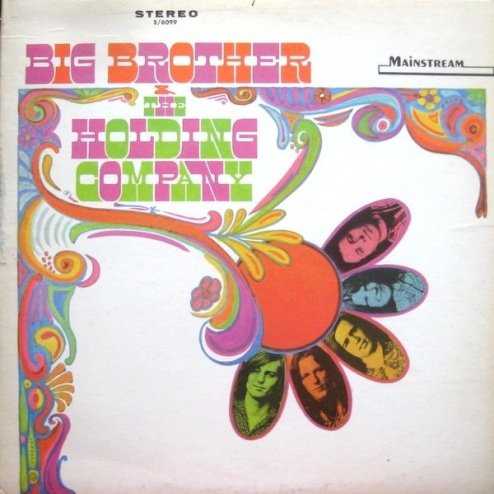 | Album: 1 of 12 Title: Big Brother & the Holding Company Released: 1967-09 Tracks: 12 Duration: 27:39 Scroll: Up Down Top Bottom 25% 50% 75% Spotify Allmusic Wikipedia AlbumCover | 1 Bye, Bye Baby (02:38) 2 Easy Rider (02:24) 3 Intruder (02:28) 4 Light Is Faster Than Sound (02:31) 5 Call on Me (02:35) 6 Coo Coo (single) (01:58) 7 Women Is Losers (02:03) 8 Blindman (02:03) 9 Down on Me (02:06) 10 Caterpillar (02:16) 11 All Is Loneliness (02:18) 12 The Last Time (02:14) |
 | Album: 2 of 12 Title: Cheap Thrills Released: 1968-08-17 Tracks: 7 Duration: 37:08 Scroll: Up Down Top Bottom 25% 50% 75% Spotify TrackSamples Allmusic Wikipedia AlbumCover | 1 Combination of the Two (05:48) 2 I Need a Man to Love (04:54) 3 Summertime (04:01) 4 Piece of My Heart (04:15) 5 Turtle Blues (04:22) 6 Oh, Sweet Mary (04:16) 7 Ball and Chain (09:30) |
| Cheap Thrills : Allmusic album Review : Cheap Thrills, the major-label debut of Janis Joplin, was one of the most eagerly anticipated, and one of the most successful, albums of 1968. Joplin and her band Big Brother & the Holding Company had earned extensive press notice ever since they played the Monterey Pop Festival in June 1967, but for a year after that their only recorded work was a poorly produced, self-titled album that theyd done early in their history for Mainstream Records; and it took the band and the best legal minds at Columbia Records seven months to extricate them from their Mainstream contract, so that they could sign with Columbia. All the while, demand continued to build, and they still faced the problem of actually delivering something worthy of the press theyd been getting -- Columbia even tried to record them live on-stage on the tour they were in the midst of when the new contract was signed, but somehow the concert tapes from early March of 1968 didnt capture the full depth of their work. So they spent March, April, and May in the studio with producer John Simon and, miraculously, emerged with something that was as exciting as anything theyd done on-stage. When Cheap Thrills appeared in August 1968 -- sporting a Robert Crumb cover on its gatefold jacket that constituted the most elaborate album design ever lavished on a rock album from Columbia Records, as well as a pop-art classic rivaling the Beatles Sgt. Peppers jacket -- it shot into the charts, reaching number one and going gold within a couple of months, and "Piece of My Heart" became a Top 40 hit and helped to propel the LP to over a million sales. Joplin, with her ear- (and vocal cord-) shredding voice, was the obvious standout. Nobody had ever heard singing as emotional, as desperate, as determined, or as loud as Joplins, and Cheap Thrills was her greatest moment. Not that everything was done full out -- there were relatively quiet moments on the album that were as compelling as the high-wattage showcases; her rendition of George Gershwins "Summertime" was the finest rock reinterpretation of a standard done by anybody up to that time (though, in an incident recalled in his autobiography Clive, when Columbia Records president Clive Davis played it to Richard Rodgers to give him an example of some of the sounds that younger audiences of the late 60s were listening to, the 66-year-old Rodgers stomped out of the Columbia corporate offices in fury, vowing never to write another song); and Joplins own "Turtle Blues" showed that she and the band could turn down and do credible acoustic blues, in something like an authentic period Bessie Smith (or, more properly, Memphis Minnie) sound. Big Brothers backup, typical of the guitar-dominated sound of San Francisco psychedelia, made up in enthusiasm what it lacked in precision. But everybody knew who the real star was, and Joplin played her last gig with Big Brother while the album was still on top of the charts. Neither she nor the band would ever equal it. Heard today, Cheap Thrills is a musical time capsule and remains a showcase for one of rocks most distinctive singers. | ||
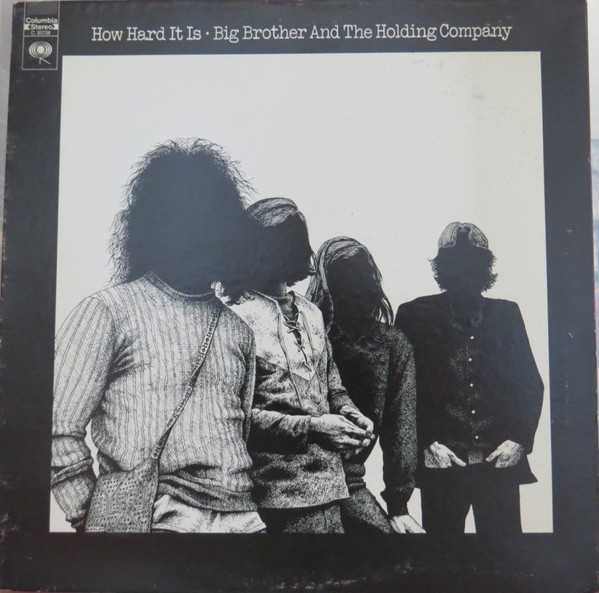 | Album: 3 of 12 Title: How Hard It Is Released: 1970 Tracks: 10 Duration: 00:00 Scroll: Up Down Top Bottom 25% 50% 75% Spotify Allmusic AlbumCover | 1 How Hard It Is (?) 2 Youve Been Talkin Bout Me, Baby (?) 3 House on Fire (?) 4 Black Widow Spider (?) 5 Last Band on Side One (?) 6 Nu Boogaloo Jam (?) 7 Maui (?) 8 Shine On (?) 9 Buried Alive in the Blues (?) 10 Promise Here Anything but Give Her Arpeggio (?) |
| How Hard It Is : Allmusic album Review : The second and final of the post-Janis Joplin Big Brother albums for Columbia looks and sounds like the closing of a chapter. A picture of Big Brother inside the gatefold has the band glowing with heavenly light; the cover photo is more telling, with faceless men standing in the shadows. To realize how good a Big Brother & the Holding Company album this is, all one has to do is play it next to Do What You Love, the groups release from 1998. On that disc, Lisa Battle is a commendable vocalist, but Do What You Love feels strained in both songwriting and performance. How Hard It Is, on the other hand, from 27 years earlier, is right on target. The title track feels like vintage Big Brother. Kathy McDonald is credited as a guest artist on "Black Widow Spider"; she co-sings the lead, but it sure sounds like her on "How Hard It Is" and "House on Fire" as well and, eerily, it is much like when Janis sang in unison with the band. The major difference is that they can play their instruments better here, four years after the Monterey Pop Festival brought them to the attention of Clive Davis. Nick Gravenites and McDonald were the perfect choices to step in, Gravenites having written two tracks on Joplins Kozmic Blues LP and also having performed with her on Joplin in Concert. McDonald has sweetness, but can reach in and find some gravel to complement Gravenites. Everything on this album is listenable, and the three instrumentals -- "Last Band on Side One," "Maui," and "Promise Her Anything, But Give Her Arpeggio" -- are statements that the band members are real musicians, journeymen with vision. The loss of more recorded music by this group from this point in time is a tragedy. The Gravenites version of "Buried Alive in the Blues," the song he wrote for Joplins Pearl album, is chilling; her death happened hours before the scheduled session when she was to sing on the Full Tilt Boogie Bands recording. Sony would be wise to include Big Brothers rendition on future copies of Pearl: It completes the circle. Big Brother would do well to continue in the more bluesy direction this album pointed to rather than perform Janis Joplins hits in small clubs. The instrumental "Maui" and the song "Shine On" are as good as anything Moby Grape and Quicksilver Messenger Service could conjure up. Sam Andrew, James Gurley, Peter Albin, and David Getz cover music from all three phases of Joplins career. The first song on side two, "Nu Boogaloo Jam," is pure Kozmic Blues Band, which Sam Andrew was part of at the beginning; the aforementioned "Buried Alive in the Blues," as stated, was recorded by the Full Tilt Boogie Band for Pearl. This album covers the gamut of styles that Joplin would bring to the world between 1968 and 1970. Its a catastrophe that this band was waiting for its lead singer to come home for the inevitable reunion; Joplins death affected many lives and the body of work this band could have amassed. Where the Doors went off into a brief and spirited rock-jazz journey for two albums -- Jim Morrisons band experimenting with ideas they couldnt attempt as a superstar pop group -- Big Brother had lost its Morrison and was lost without its focal point. How Hard It Is and the album that preceded it, Be a Brother, are very musical and very good albums, but they just dont have the electric majesty of Cheap Thrills, an album that took their wildness and used it as an incredible bed for Joplins truly cosmic vocal work and emotion. If allowed to record as the Grateful Dead and the Jefferson Airplane had despite those bands personnel changes, there would now be a deep catalog of San Francisco rock from this essential psychedelic/experimental ensemble. Although Janis Joplin had a guest vocal on Be a Brother, her only participation here consists of photos inside the album jacket, a family tree of sorts. This is a striking record by an important band, but Joplins contributions were so overwhelming that the integrity in these grooves never got the chance to reach a wider audience when it was first released. | ||
 | Album: 4 of 12 Title: Be a Brother Released: 1970 Tracks: 10 Duration: 35:43 Scroll: Up Down Top Bottom 25% 50% 75% Spotify Allmusic AlbumCover | 1 Keep On (04:19) 2 Josephs Coat (03:10) 3 Home on the Strange (02:14) 4 Someday (02:17) 5 Heartache People (06:36) 6 Sunshine Baby (03:32) 7 Mr. Natural (03:31) 8 Funkie Jim (03:45) 9 Ill Change Your Flat Tire, Merle (03:16) 10 Be a Brother (03:03) |
| Be a Brother : Allmusic album Review : Whether Big Brother & the Holding Company would have made any waves at all in the late-60s San Francisco music scene sans Janis Joplin could be argued. Be A Brother is a good indicator of what they would have sounded like without her amazing voice. Recorded in 1970, guitarist David Schallock and singer/songwriter/producer Nick Gravenites were added to help fill the space created with the absence of Joplin. These ten original compositions include "Home on the Strange," "Mr. Natural," "Funkie Jim," and "Ill Change Your Flat Tire, Merle" dedicated to Merle Haggard. This is a decent blues-based session similar to early Butterfield Blues Band records, which isnt a bad thing at all. | ||
 | Album: 5 of 12 Title: Cheaper Thrills Released: 1990 Tracks: 12 Duration: 39:03 Scroll: Up Down Top Bottom 25% 50% 75% Allmusic AlbumCover | 1 Come on Baby Let the Good Times Roll (02:36) 2 I Know You Rider (03:16) 3 Moanin at Midnight (05:02) 4 Hey Baby (02:47) 5 Down on Me (02:46) 6 Whisperman (01:48) 7 Women Is Losers (03:42) 8 Blow My Mind (02:34) 9 Ball & Chain (06:43) 10 Coo-Coo (02:28) 11 Gutras Garden (04:40) 12 Harry (00:35) |
| Cheaper Thrills : Allmusic album Review : Recorded on July 28, 1966, before the band had cut any studio material, this performance was one of Janis Joplins first gigs with Big Brother. The sound is decent, with several famous staples of their repertoire already in place -- "Down on Me," "Coo-Coo," "Ball and Chain." Yet in comparison with their best studio and live recordings from 1967 and 1968, this is a bit limp. Big Brother were never noted for their polish, but made up for that with reckless bravado; however, thats largely missing at this juncture in their development, which finds them sounding somewhat tentative in their adaptation of R&B; and garage-band ethos to heavy guitar arrangements. Big Brother were never noted for their songwriting ability either, and this set is pretty reliant on R&B; staples like "Let the Good Times Roll" and "I Know You Rider"; the unabashedly psychedelic workout "Gutras Garden" hasnt aged well at all. Joplins vocals are fairly strong, but these early versions of "Down on Me" and, especially, "Ball and Chain" dont hold a candle to her performances of the same tunes at the 1967 Monterey Pop Festival. Other members of the band take the lead vocal on a few numbers, emphatically proving -- as they always did when given a chance -- that Joplin was necessary to put them on the map. This recording is an interesting glimpse into the groups formative days, though, and features eight songs not on their late-60s albums. | ||
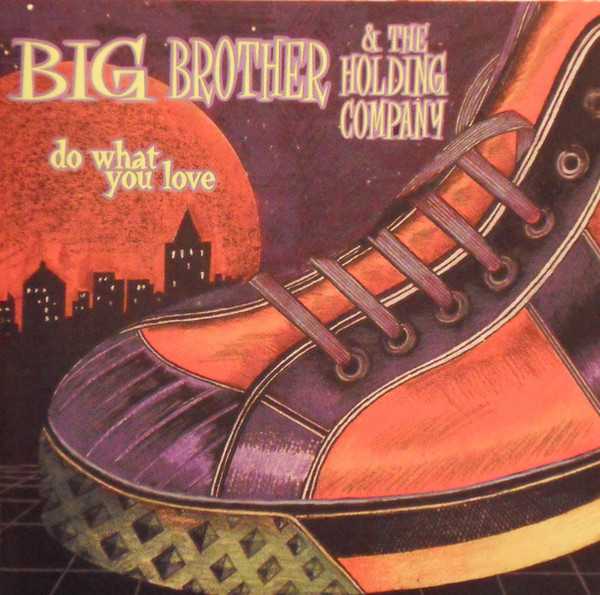 | Album: 6 of 12 Title: Do What You Love Released: 1998 Tracks: 9 Duration: 32:16 Scroll: Up Down Top Bottom 25% 50% 75% Spotify Allmusic AlbumCover | 1 Take Off (03:27) 2 Save Your Love (05:20) 3 I Need a Man to Love (06:14) 4 Bos Bio (03:16) 5 Women is Losers (04:46) 6 Freedom (03:11) 7 The OK Chorale (00:53) 8 Do What You Love (04:15) 9 Back Door Jamb (00:50) |
| Do What You Love : Allmusic album Review : Big Brother & the Holding Companys two post-Joplin releases, Be a Brother and How Hard It Is, are two of the best recordings by bands picking up the pieces after the losses of their respective comets/focal points. Where the Billion Dollar Babies and Spiders from Mars had to move on without Alice Cooper and David Bowie, respectively, their musical genre didnt lend itself to reconstituted hard rock groups -- look at the sad fate of post-Jeff Lynne ELO or BTO without Randy Bachman. Like Grace Slick, Janis Joplin joined the group in which she rose to fame after it had formed, but as the Jefferson Airplane could reinvent itself for the future as a Starship with or without Slick, Big Brother was never given the chance to continue producing its experimental psychedelic pop. The layoff results in the bands weakest effort ever. Lisa Battle has a strong voice, and is so different from Janis that the band should have developed a new sound for her. It didnt, doing a disservice to this able singer. Battle does a great job on the funky tribute to Joplin that is "Women Is Losers"; it succeeds because it is not a note-for-note copy but a new look at an original Joplin composition. On the other hand, what is the point in trying to recreate "I Need a Man to Love?" You cant possibly top the electric John Simon production from Cheap Thrills, or Live at Winterland 68s power. The production values here are spotty as well. "Take Off" is not nearly as good an opener as "Combination of the Two," and a new interpretation of that would have been more substantial. The high points of this CD are "Save Your Love" (where Battles voice carefully patterns itself around this slinky blues-pop, despite the low-budget surroundings); the title track; and two very short pieces, "The OK Chorale" and "Back Door Jamb." Both those musical exercises should have been expanded to give Battle the chance to identify herself as Big Brothers current singer. The band, after all, began pre-Janis by creating unorthodox sounds. Here they have abandoned what made them so special, and appear to be imitating their past. Had they continued to release records as Big Brother in the 70s and 80s, there is the possibility they could have developed a following like that which the Grateful Dead nurtured. Kathy McDonald and Nick Gravenites, who both appeared on Be a Brother and How Hard It Is, are the kind of talents who bring out the best these musicians have to offer. Seven or eight albums with that lineup would have created a formidable body of work. Put Lisa Battle into that mix as well, and the possibilities are endless. Do What You Love has no catalog number and no direction -- even more disappointing when you realize these are super-talented journeymen wasting their time. | ||
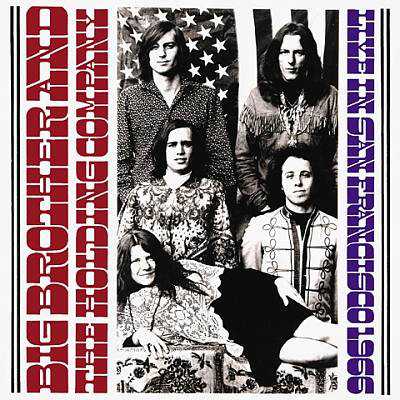 | Album: 7 of 12 Title: Live in San Francisco, 1966 Released: 2002-04-30 Tracks: 14 Duration: 48:21 Scroll: Up Down Top Bottom 25% 50% 75% Allmusic AlbumCover | 1 (Come on Baby) Let the Good Times Roll (02:37) 2 I Know You Rider (03:13) 3 Moanin at Midnight (04:57) 4 Hey Baby (02:50) 5 Down on Me (02:45) 6 Whisperman (01:46) 7 Women Is Losers (03:48) 8 Blow My Mind (02:34) 9 Oh My Soul (02:34) 10 Ball & Chain (06:43) 11 Coo-Coo (02:30) 12 Gutras Garden (04:36) 13 Harry (00:37) 14 Hall of the Mountain King (06:51) |
| Live in San Francisco, 1966 : Allmusic album Review : Recorded on July 28, 1966, before the band had cut any studio material, this performance was one of Janis Joplins first gigs with Big Brother. The sound is decent, with several famous staples of their repertoire already in place: "Down on Me," "Coo-Coo," and "Ball and Chain." Yet, in comparison with their best studio and live recordings from 1967 and 1968, this is a bit limp. Big Brother was never noted for their polish, but made up for that with reckless bravado; however, thats largely missing at this juncture in their development, which finds them sounding somewhat tentative in their adaptation of R&B; and garage band ethos to heavy guitar arrangements. Big Brother was never noted for their songwriting ability either, and this set is pretty reliant on R&B; staples like "Let the Good Times Roll" and "I Know You Rider"; the unabashedly psychedelic workout "Gutras Garden" hasnt aged well at all. Joplins vocals are fairly strong, but these early versions of "Down on Me" and, especially, "Ball and Chain" dont hold a candle to her performances of the same tunes at the 1967 Monterey Pop Festival. Other members of the band take the lead vocal on a few numbers, emphatically proving -- as they always did when given a chance -- that Joplin was necessary to put them on the map. This show is an interesting glimpse into the groups formative days, though, and features eight songs not on their late-60s albums. This set of material was first released in 1984 as Cheaper Thrills, and since then its been around on various labels under various titles. The 2002 Varese Sarabande edition differs from previous iterations only in that it adds a live version of "Hall of the Mountain King," recorded at television station KQED in San Francisco on April 25, 1967 (a pretty cool cut, though its been long available as part of the Ball and Chain video, which includes the entire half-hour set). | ||
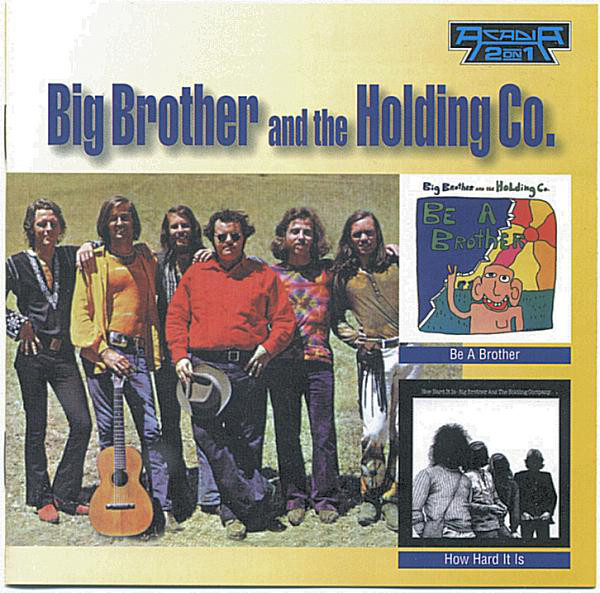 | Album: 8 of 12 Title: Be a Brother / How Hard It Is Released: 2008-05-26 Tracks: 20 Duration: 1:13:09 Scroll: Up Down Top Bottom 25% 50% 75% Allmusic AlbumCover | 1 Keep On (04:20) 2 Josephs Coat (03:10) 3 Home on the Strange (02:14) 4 Someday (02:16) 5 Heartache People (06:35) 6 Sunshine Baby (03:29) 7 Mr. Natural (03:32) 8 Funkie Jim (03:46) 9 Ill Change Your Flat Tire, Merle (03:13) 10 Be a Brother (03:02) 11 How Hard It Is (04:22) 12 Youve Been Talkin Bout Me, Baby (03:26) 13 House on Fire (03:56) 14 Black Widow Spider (03:34) 15 Last Band on Side One (01:56) 16 Nu Boogaloo Jam (03:25) 17 Maui (03:26) 18 Shine On (05:26) 19 Buried Alive in the Blues (03:58) 20 Promise Here Anything but Give Her Arpeggio (03:55) |
| Be a Brother / How Hard It Is : Allmusic album Review : This two-fer from Acadia features a pair of out of print LPs by Big Brother & the Holding Company after vocalist Janis Joplin left the band. Originally issued on Columbia in 1970 and 1971, Be a Brother and How Hard It Is, arent representative of the band at its best and can only be recommended to collectors. Casual listeners should stick with Cheap Thrills. | ||
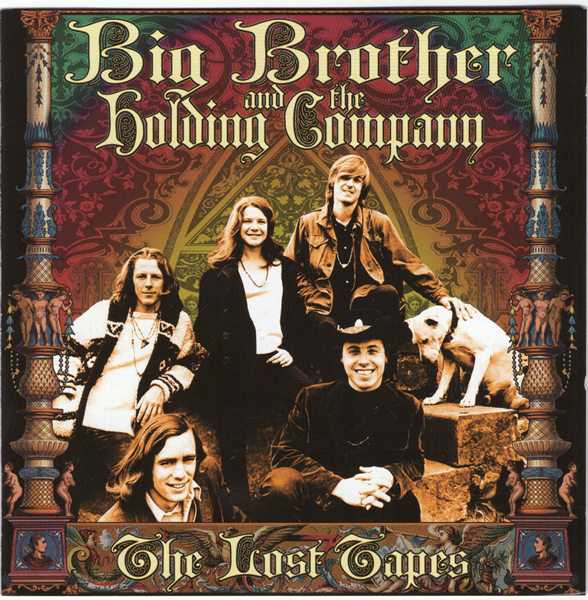 | Album: 9 of 12 Title: The Lost Tapes Released: 2008-06-24 Tracks: 26 Duration: 1:52:21 Scroll: Up Down Top Bottom 25% 50% 75% Allmusic AlbumCover | 1 Bye Bye Baby (04:11) 2 Great White Guru (05:47) 3 Women Is Losers (05:09) 4 Oh My Soul (02:35) 5 Amazing Grace (11:31) 6 Caterpillar (04:11) 7 Its a Deal (02:13) 8 Hi-Heel Sneakers (03:37) 9 Faster Pussycat, Kill! Kill! (02:23) 10 Turtle Blues (06:47) 11 All Is Loneliness (09:05) 12 Light Is Faster Than Sound (06:27) 1 (Come on Baby) Let the Good Times Roll (02:38) 2 I Know You Rider (03:14) 3 Moanin at Midnight (04:57) 4 Hey Baby (02:51) 5 Down on Me (02:45) 6 Whisperman (01:46) 7 Women Is Losers (03:48) 8 Blow My Mind (02:35) 9 Oh My Soul (02:34) 10 Ball and Chain (06:41) 11 Coo Coo (02:30) 12 Gutras Garden (04:37) 13 Harry (00:38) 14 Hall of the Mountain King (06:51) |
| The Lost Tapes : Allmusic album Review : The Lost Tapes combines previously unreleased material with performances that have been floating around on bootlegs for years. Listening to these early live recordings from late 1966 and early 1967, its hard to imagine that this is the same band that would level the audience at the Monterey Pop Festival -- alongside Jimi Hendrix and Otis Redding -- and propel Janis Joplin into superstardom. The 26 songs are a loose mix of originals from their self-titled Mainstream album, along with cover versions of "Amazing Grace," "Hi Heel Sneakers," "Let the Good Times Roll," "I Know You Rider," and "Moanin at Midnight." By far, the oddest cover is "Faster Pussycat, Kill! Kill!," which musically has absolutely nothing in common with the version performed in the Russ Meyer film by the Bostweeds. The rambling spoken intro is longer than the actual song itself! Very weird! This material is unquestionably sloppy and miles away from the slick soul-rock Joplin would perform with Full Tilt Boogie and the Kozmic Blues Band after leaving Big Brother in late 1968. Its also what makes this relic so charming; hearing a young Janis Joplin not burdened with being the star, but just another member of the band, relaxed and playful. Airlines 2008 version of The Lost Tapes was licensed from Big Brother & the Holding Company, with 24-bit remastering and notes by drummer David Getz and guitarist Sam Andrew. | ||
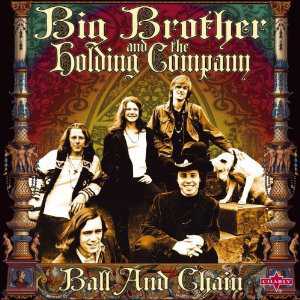 | Album: 10 of 12 Title: Ball & Chain Released: 2010 Tracks: 26 Duration: 1:03:42 Scroll: Up Down Top Bottom 25% 50% 75% Spotify AlbumCover | 1 Bye Bye, Baby (04:11) 2 Grewt White Guru (05:45) 3 Women Is Losers (05:07) 4 Oh! My Soul (02:34) 5 Amazing Grace (11:28) 6 Caterpillar (04:09) 7 Its A Deal (02:11) 8 Hi Heel Sneakers (03:36) 9 Faster, Pussycat, Kill, Kill! (02:22) 10 Turtle Blues (06:44) 11 All Is Loneliness (09:04) 12 Light Is Faster Than Sound (06:27) 1 Let The Good Times Roll (?) 2 I Know You Rider (?) 3 Moanin´ At Midnight (?) 4 Hey, Baby (?) 5 Down On Me (?) 6 Whisperman (?) 7 Women Is Losers (?) 8 Blow My Mind (?) 9 Oh! My Soul (?) 10 Ball And Chain (?) 11 Coo-Coo (?) 12 Gutra´s Garden (?) 13 Harry (?) 14 In The Hall Of The Mountain King (?) |
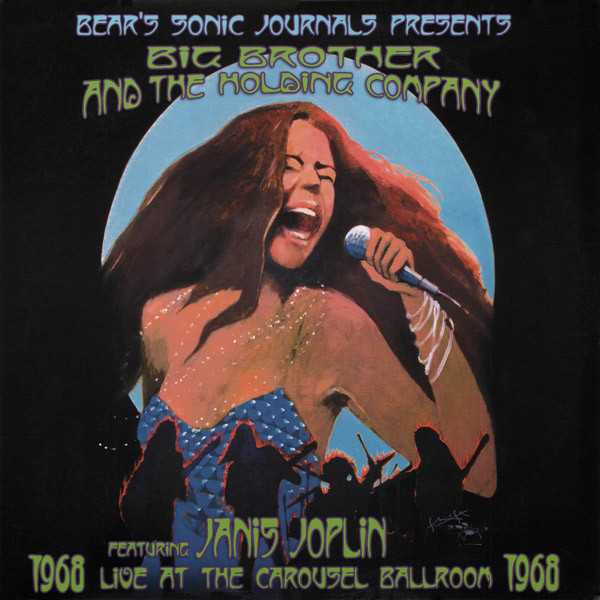 | Album: 11 of 12 Title: Live at the Carousel Ballroom 1968 Released: 2012-03-13 Tracks: 14 Duration: 1:10:42 Scroll: Up Down Top Bottom 25% 50% 75% Spotify Allmusic AlbumCover | 1 Combination of the Two (04:35) 2 I Need a Man to Love (06:39) 3 Flower in the Sun (03:11) 4 Light Is Faster Than Sound (06:02) 5 Summertime (04:29) 6 Catch Me Daddy (05:07) 7 Its a Deal (02:28) 8 Call on Me (04:04) 9 Jam - Im Mad (Mad Man Blues) (06:51) 10 Piece of My Heart (04:49) 11 Coo Coo (06:23) 12 Ball & Chain (09:22) 13 Down on Me (02:45) 14 Call on Me (03:57) |
| Live at the Carousel Ballroom 1968 : Allmusic album Review : The first entry in the Bears Sonic Journals series is, without question, a stunner. "Bear" (Augustus Owsley Stanley III), the Grateful Deads live soundman, built and manned the sound system at the Carousel Ballroom. He personally supervised this previously unreleased effort (items from it have appeared on the Joplin box with crummy sound) shortly before his untimely death in an automobile accident in 2011. (He even provides listening instructions via a brief liner essay -- one of a number of them -- including an excellent historical one from Jaan Uhelszki). There were no stage monitors then (something Bear would later pioneer); the band had to listen to the echo back from the room, the P.A., and amplifier sound to cue pitch. Here, vocals and drums are in the left channel, guitars and bass in the right -- no melding. The effect is electrifying; its exactly what one would experience as an audience member. The sound is warm, immediate, raw; full of intricacies, small flaws, and rough spots that make the performance singular. This is Big Brother still very much performing as a unit, recorded on June 23, 1968 shortly after finishing sessions for Cheap Thrills, whose release occurred two months later. Theyre comfortable enough with one another here to trust each others instincts. Joplins vocals are the centerpiece, but the wild, wooly, psychedelic rock of Big Brother -- James Gurley and Sam Andrew on guitars, bassist Peter Albin, and drummer Dave Getz -- is the engine that propels that singular voice to the heights it needs to soar to. Andrew takes alternate duet and backing vocals regularly; the rest of the band chimes in on the backing ones too. The disc begins with "Combination of the Two," with Joplin and Andrew taking turns on the vocal and a truly incendiary and wildly inventive guitar solo from Gurley. The vocal play continues on "I Need a Man to Love." Joplins reading is subtle enough to let the blues drench the tune amid the revved sonics. "Summertime" is every bit as lovely as and more soulful than the one on Cheap Thrills. "Catch Me Daddy" is a revelation of jazzy psychedelic blues. The two versions of "Call on Me" (one from Sunday night) are radically different from one another. "Piece of My Heart" features some lithe vocalizing in the verse from Joplin we havent heard before. But the true highlights here are Albins "Coo Coo," an acid-drenched instrumental, and "Ball and Chain," in what may be its definitive recorded performance. Live at the Carousel Ballroom 1968 is easily the finest gig from Big Brother & the Holding Company yet released, and its a fitting tribute to Bears inventive legacy. | ||
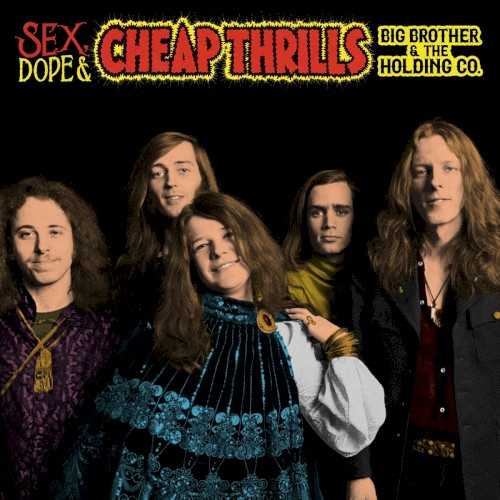 | Album: 12 of 12 Title: Sex, Dope & Cheap Thrills Released: 2018-11-30 Tracks: 30 Duration: 2:18:13 Scroll: Up Down Top Bottom 25% 50% 75% AlbumCover | 1 Combination of the Two (take 3) (05:33) 2 I Need a Man to Love (take 4) (08:05) 3 Summertime (take 2) (04:10) 4 Piece of My Heart (take 6) (04:55) 5 Harry (take 10) (01:12) 6 Turtle Blues (take 4) (04:47) 7 Oh, Sweet Mary (04:23) 8 Ball and Chain (07:28) 9 Roadblock (05:43) 10 Catch Me Daddy (take 1) (05:34) 11 It’s a Deal (take 1) (02:42) 12 Easy Once You Know How (take 1) (04:35) 13 How Many Times Blues Jam (05:26) 14 Farewell Song (take 7) (05:02) 15 Flower in the Sun (take 3) (03:14) 16 Oh Sweet Mary (06:55) 17 Summertime (take 1) (03:14) 18 Piece of My Heart (take 4) (04:07) 19 Catch Me Daddy (take 9) (03:15) 20 Catch Me Daddy (take 10) (04:22) 21 I Need a Man to Love (take 3) (07:08) 22 Harry (take 9) (01:11) 23 Farewell Song (take 4) (04:27) 24 Misery’n (takes 2 & 3) (03:57) 25 Misery’n (take 4) (04:58) 26 Magic of Love (take 1) (03:19) 27 Turtle Blues (take 9) (03:59) 28 Turtle Blues (last verse takes 1 - 3) (04:35) 29 Piece of My Heart (take 3) (04:32) 30 Farewell Song (take 5) (05:12) |